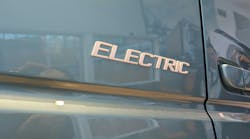While I did not attend the IAA Transportation 2022 trade show in Hannover, Germany, I did see reports on some of the remarks made by key industry leaders. Jennifer Rumsey, CEO of Cummins, talked about the company’s strategy for getting its products to net-zero emission levels. She spoke about a variety of ways to do that, but one thing she said really struck me.
“Improving fuel economy doesn’t always grab the headlines, but it adds up to real results,” she said. The Cummins executive says that if 100,000 internal combustion engine (ICE) vehicles are 10% more efficient, that is the same as deploying 10,000 zero-emission vehicles. Think about that.
I know some folks have accused NACFE of being too focused on electric vehicles, and it may seem that way because we do believe that electric vehicles are going to be the long-term solution for reducing emissions. However, we know that we will not just flip a switch and get to a future where all trucks are battery electric.
See also: Tire pressure systems are investments in efficiency
We have been talking about the messy middle since 2019. This is a time when fleets have many options for a cleaner goods movement as we all work to reduce trucking’s greenhouse gas emissions. We are in the process of working on a white paper that is going to focus on how the messy middle has evolved since we first wrote about it and to look at where things stand today. We hope to publish the paper early next year.
Getting back to Rumsey’s remarks, she’s right. The general media seem to be focusing more on the new technologies that are coming to trucking rather than the changes that are taking place with ICE vehicles. And I get that. New technology is cool, and there are some very charismatic people talking about it. In addition, when changes occur with new technology, they tend to have a big impact. But when you look at existing technology, you are not likely to see big leaps in efficiency. It is more like slow and steady, small changes that move the needle a little bit but aren’t likely to generate much excitement—even though they probably should.
See also: Using the Inflation Reduction Act to scale EV adoption
We also are in the process of updating our Annual Fleet Fuel Study and will issue our findings in December. Spoiler alert: We will be sharing that all trucks reporting fuel consumed and miles traveled under the International Fuel Tax Agreement (IFTA) have improved their efficiency from 5.91 in 2016 to 6.24 in 2020. That’s over a 5% increase in fuel economy in just five years! Keep in mind this includes all heavy-duty tractors on our country’s highways. That is a savings of about 1.5 million gallons of diesel fuel!
I am going to quote Rumsey again: “We recognize that our industry contributes to the impact of climate change on our planet, and we have an opportunity to make a positive impact for our customers and on the planet by being a part of the solution. We intend to lead during this energy transition, and to do so by providing our customers with the right technology, at the right time, with a deep understanding of their needs and applications.”
Decarbonizing trucking includes increasing efficiency on diesel trucks, navigating the messy middle, and getting to zero. And definitely making some headlines along the way.
Michael Roeth has worked in the commercial vehicle industry for nearly 30 years, most recently as executive director of the North American Council for Freight Efficiency (NACFE). He serves on the second National Academy of Sciences Committee on Technologies and Approaches for Reducing the Fuel Consumption of Medium and Heavy-Duty Vehicles and has held various positions in engineering, quality, sales, and plant management with Navistar and Behr/Cummins.



